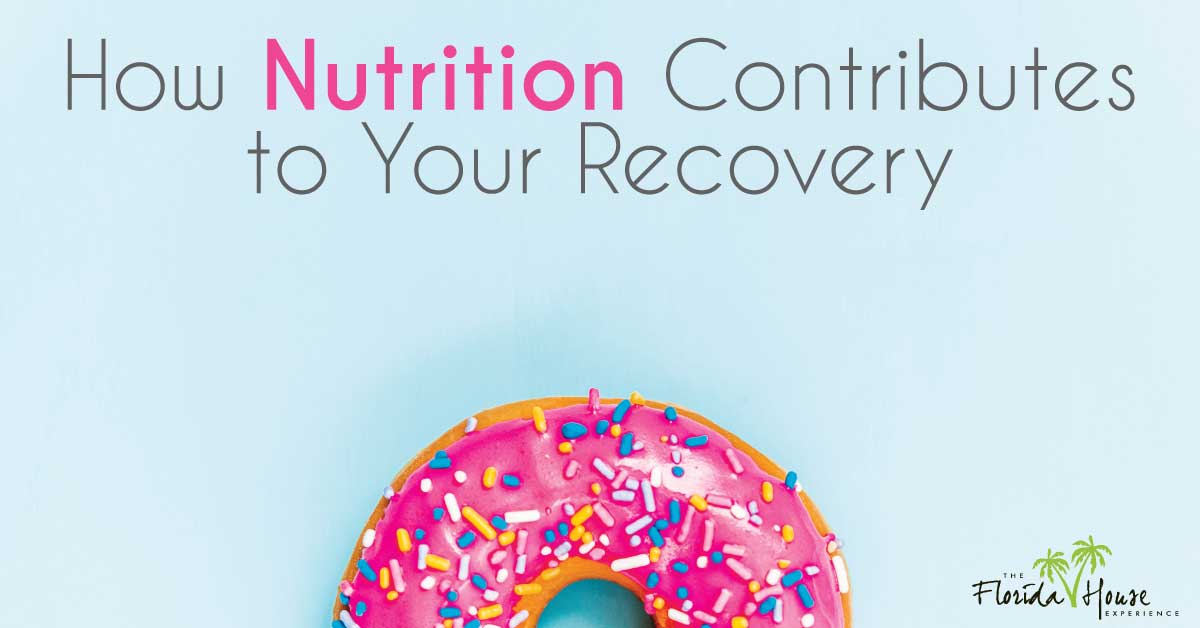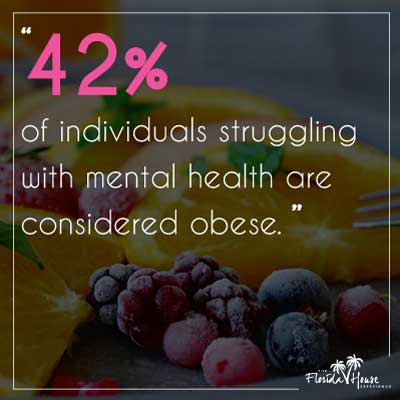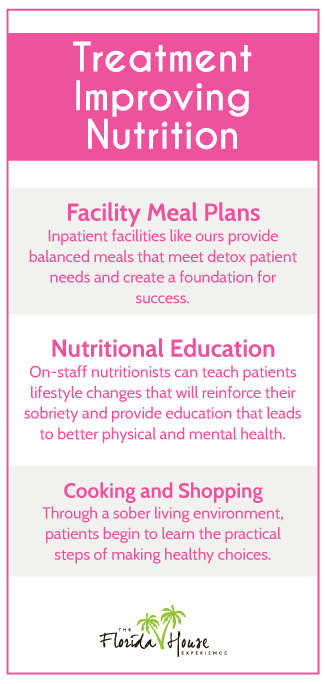
There is a direct correlation between addiction and nutrition. We’ve found that the majority of those who come into addiction treatment do so with limited knowledge of nutrition and poor eating habits. In fact, 42% of individuals struggling with mental health are considered obese. Primary factors contributing to poor nutrition include financial hardship, lack of control and immediate gratification. It’s imperative that when an individual in recovery enters addiction treatment they are introduced to a nutritional diet and offered education into maintaining a balanced diet upon discharge.
 The Relationship Between Nutrition and Recovery
The Relationship Between Nutrition and Recovery
Most individuals entering addiction treatment are malnourished. Many are unable to afford a proper diet due to the majority of their money going to feeding their habit, others simply live a life feeding gratification and elect poor diet as a result. The same behavior that contributes to addictive behavior translates into other areas of their life. As a result, many addiction treatment programs are sure to include meal plans comprised of nutritious food and staff on site that can help develop nutritional meal plans and strategies upon discharge:
- Facility Meal Plans – Addiction treatment programs are experienced with assessing the initial health of clients during intake. For the most part, individuals active in addiction are malnourished and, dependent on their drug of choice, can be significantly underweight or overweight – but rarely healthy. Those addicted to some narcotics tend to have a restricted appetite and have survived off a caloric deficit comprised of inexpensive food with little to no nutritional value. This is even more apparent when these individuals graduate into transitional living situations where they’re responsible for their own shopping and staff can observe the types of groceries purchased. Ensuring that you intake the proper amount of vitamins, nutrients, and sustenance is extremely vital while going through detox and treatment. When these are unbalanced in your body, it can make withdrawal symptoms more painful and can make cravings harder to ignore. If you make sure to provide your body with the proper sustenance throughout treatment you will make the entire recovery process easier and smoother.It’s for this reason that we at FHE Health invest substantial amounts of money into developing nutrition rich meal plans for clients during their stay. The proper combination of meats, vegetables, fats and carbohydrates are provided by chefs that embody flavors suitable for even the pickiest of eaters. It is common for clients to put on significant amounts of weight in a short period of time as their body metabolizes food it has starved for. Additionally, when coming off of opiates, your body craves sugar with an extreme intensity. While eating large amounts of sugar is in not healthy choice, long-term, it is still important to provide an addict with sugary foods in order to help them work through the detoxification process. Typically, the cravings for sugar subsides after the detoxification process is complete, and the person can get back on a regular food schedule. At FHE Health, we want to make sure you are as comfortable as possible while detoxing, and are always willing to provide ice cream or other sugary substances to help people through.
 Nutritional Education – The vast majority of clients entering addiction treatment programs don’t know how to eat properly. In conjunction with the impact their substance of choice may have on their appetite and cravings, many have never taken into consideration what they’re body needs to achieve peak performance – others simply don’t care in the same way they don’t care about how they treat their body with other toxins. When clients move out of initial treatment programs into a transitional living arrangement, it becomes far more apparent what the lack of knowledge for healthy eating looks like.Many clients tend to spend money primarily on microwavable meals, snacks, and sugary drinks. All of these are easy to eat, taste great and fall in line with past behavior; it’s all they know. This is why many addiction treatment programs have begun incorporating a nutritionist into their roster of staff. These professionals take time with clients to discuss their food habits, likes and dislikes, then work to develop strategies that provide customized nutrition plans that help to provide these individuals with what they need to lead a healthier way of life. From an education standpoint, this means helping clients see what makes up their current diet and how small changes can overcome some of the physical issues they are struggling with including fatigue, anxiety, and body confidence issues.
Nutritional Education – The vast majority of clients entering addiction treatment programs don’t know how to eat properly. In conjunction with the impact their substance of choice may have on their appetite and cravings, many have never taken into consideration what they’re body needs to achieve peak performance – others simply don’t care in the same way they don’t care about how they treat their body with other toxins. When clients move out of initial treatment programs into a transitional living arrangement, it becomes far more apparent what the lack of knowledge for healthy eating looks like.Many clients tend to spend money primarily on microwavable meals, snacks, and sugary drinks. All of these are easy to eat, taste great and fall in line with past behavior; it’s all they know. This is why many addiction treatment programs have begun incorporating a nutritionist into their roster of staff. These professionals take time with clients to discuss their food habits, likes and dislikes, then work to develop strategies that provide customized nutrition plans that help to provide these individuals with what they need to lead a healthier way of life. From an education standpoint, this means helping clients see what makes up their current diet and how small changes can overcome some of the physical issues they are struggling with including fatigue, anxiety, and body confidence issues.- Learning to Cook – We’ve found in our experience that the majority of recovering addicts are illiterate in the kitchen. They tend to lack basic skills for identifying and selecting the right ingredients for meals, picking ripe vegetables and bringing all the ingredients together into a delicious meal. The reality is on a cost basis, cooking healthy meals is very much affordable even on a shoestring budget. However, if you don’t know how to shop or cook, it’s hard to overcome poor eating habits of unhealthy foods that provide immediate gratification when what they cook tastes bland at best. This is why in addition to nutritional education; many addiction treatment centers offer cooking lessons to help clients understand how to make meals within their budgets that are delicious and nutritious. On-site nutrition experts experienced for working with addicts understand the patience that is required to guide them through the grocery aisles and offering basic tutorials for knife skills and seasoning. When properly taught, the success of recovering individuals to transform their physical lives from a recovery and nutritional basis allow for significantly greater success in the long run.
Cooking can become a great way to save money as a person in recovery is working on getting back on their feet. This will help you build wealth to pay other bills and meet other needs in your life and your families life. it can be a difficult transition from always buying food to cooking on a regular basis, but the financial benefit is enough to learn. Residential treatment is a great place to learn these skills. Additionally, by buying your own groceries and cooking your own food, you know exactly what you are putting in your body and can learn how it affects your body. When you know every ingredient of your meals you can become better in tune with the hunger impulses of your body, allowing you to live a healthy and better-informed life.
Nutrition and Recovery Go Hand-in-Hand
The reality is that a recovery program goes far beyond just the abstinence of mind-altering substances. Most clients entering treatment lack many fundamental skills of being a healthy adult. This is why many addiction treatment programs have consciously incorporated nutritional life skills into their recovery programs to help provide the appropriate knowledge and practical education they can take into the next phase of their lives. Many just coming off the streets are malnourished and culinary experts purely in the way of the microwave. Experienced addiction treatment programs are aware of this reality and take it into serious consideration when including nutrition experts into their staff to help design meal plans during treatment and corresponding education to individuals preparing for discharge. If you are looking for more information on how nutrition and recovery go hand-in-hand, contact us today to discuss – it’s our pleasure to be your resource!
Entering back into normal life after years of addictive behavior can be very intimidating. When in active addiction, we lose the standard life skills that we would have learned otherwise. FHE Health is here to assure you that we will help you through every step of the transition from addiction to sobriety. We can help you in all aspects of your life including nutrition, financial management, career goals, family responsibilities, and more. We will give you all the tools necessary to get sober and stay sober long after leaving the Florida House. All you need to do is take the first step and give us a call. Our compassionate counselors are standing by to answer any questions you may have.






